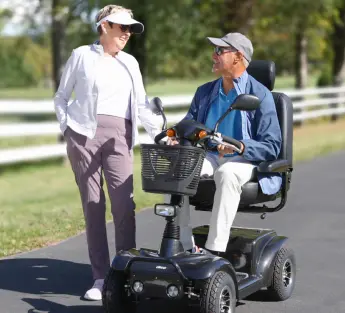|
This is an age of consumerism. Choice. Independence. Products to make our lives easier, slicker, more efficient, or just plain fun. We can read publications such as Consumer Report to compare and contrast products to help us with our choices. Products can be bought in many different venues, depending on the level of assistance the consumer needs in making a decision. We can go to Computer Discount Warehouse and receive a great deal of guidance in choosing a computer system or put components together ourselves from a computer catalog.
This same phenomenon has occurred in the medical industry. You want to be the decision-maker in your own life -- to be provided with choices and information with which you can make educated decisions. Finding the information with which to make that decision can be a challenge in the durable medical equipment industry. Layer on top of that the fact that most people who need rehabilitation technology, such as wheelchairs and seating, rely on third-party payers to fund the equipment. If the wrong equipment is purchased, your funding source usually will not reimburse for more equipment for about five years or unless your medical condition radically changes.
Ask A Therapist
So under what situations should you seek advice from a clinician knowledgeable about rehab technology? Since you are buying your products on the Internet, and doing so to save money, remember that hiring a seating clinician for advice should also help you to save money by ensuring that you are measuring correctly and that you are buying the most appropriate product for your needs. I’d like to talk about some situations where hiring a seating clinician can assist you with decisions.
- You are a first time buyer. Fifteen to 20 years ago there were very few seating and mobility products from which to choose. Now, there is a plethora of equipment available. Each of those pieces of equipment has certain characteristics and available adjustability. A knowledgeable clinician can pare down the products after listening to your needs.
- You have a medical problem that may interfere with, or complicate, product selection. This might include something like a pressure sore. Sometimes, working with the more traditional medical model, or someone associated with it, can prevent mild to severe problems later on.
- If you require some training for a new piece of equipment. For example, if you have been using a folding frame wheelchair, and choose a rigid frame wheelchair, you might need assistance in learning new car transfer methods.
When working directly with a clinician, you must collect and think about information about you life prior to an appointment. Below are things to bring to the clinical appointment. If the clinician does not have a good understanding of your needs, it is impossible to assist with making the right product choices.
- The clinician needs to know the diagnoses and how long you have had had those diagnoses. Each diagnosis carries with it certain characteristics that impact the end product. For example, if you have a spinal cord injury with no sensation on the buttocks, there are certain types of cushions the clinician would try. A degenerative disease might lead toward equipment that is modular; that can change as your condition changes.
- The clinician needs to know the home/work/community environment that you live in to ensure the equipment will be functional in the environment. For example, if the seat height of your wheelchair is too high, you might not be able to fit under the work desk. You might want to bring relevant measurements, such as door widths and counter heights to the evaluation. If the equipment cannot be used in the environments it needs to work in, what good is it?
- The clinician needs to know how you perform functional skills, such as transferring from the wheelchair or dressing. Each part of the seating system and wheelchair are separately ordered with your physical and functional needs in mind. It’s a balancing act and often a compromise to meet these two needs. You should describe and, if possible, demonstrate how you perform these skills.
- The clinician needs to know the type of equipment you have had in the past and why it has or has not worked. This will assist in narrowing the choices.
Find the Right Therapist
How do you locate a clinical therapist with experience in assistive technology?
- Ask the therapist how much experience he or she has in working with seating and mobility; what conferences he or she attends to keep up with changes; how much of his or her job is involved in evaluating for seating and mobility. Not every therapist has expertise in this area.
- Ask the therapist if she/he has attended continuing education related to seating and mobility evaluation and equipment. This is not generally an area that is covered in undergraduate education. One must attend some courses to keep abreast of what is going on in the field.
- Most people will have third party coverage for a therapy evaluation and training, if necessary. Be sure to explore your third party payer’s requirements for the therapy evaluation to be covered (i.e., doctor’s order).
- Most third party payers require a letter of medical necessity from the physician. The therapist can coordinate this letter and have it signed by the physician.
If you save money buying your equipment on the Internet, know when and how to ask for assistance. Paying a therapist for his or her time to ensure you are ordering the right equipment could be your best investment. Good luck!
|





 Contact Us
Contact Us
 M-F 9am - 5pm ET
M-F 9am - 5pm ET
 Request parts
Request parts Request Service
Request Service